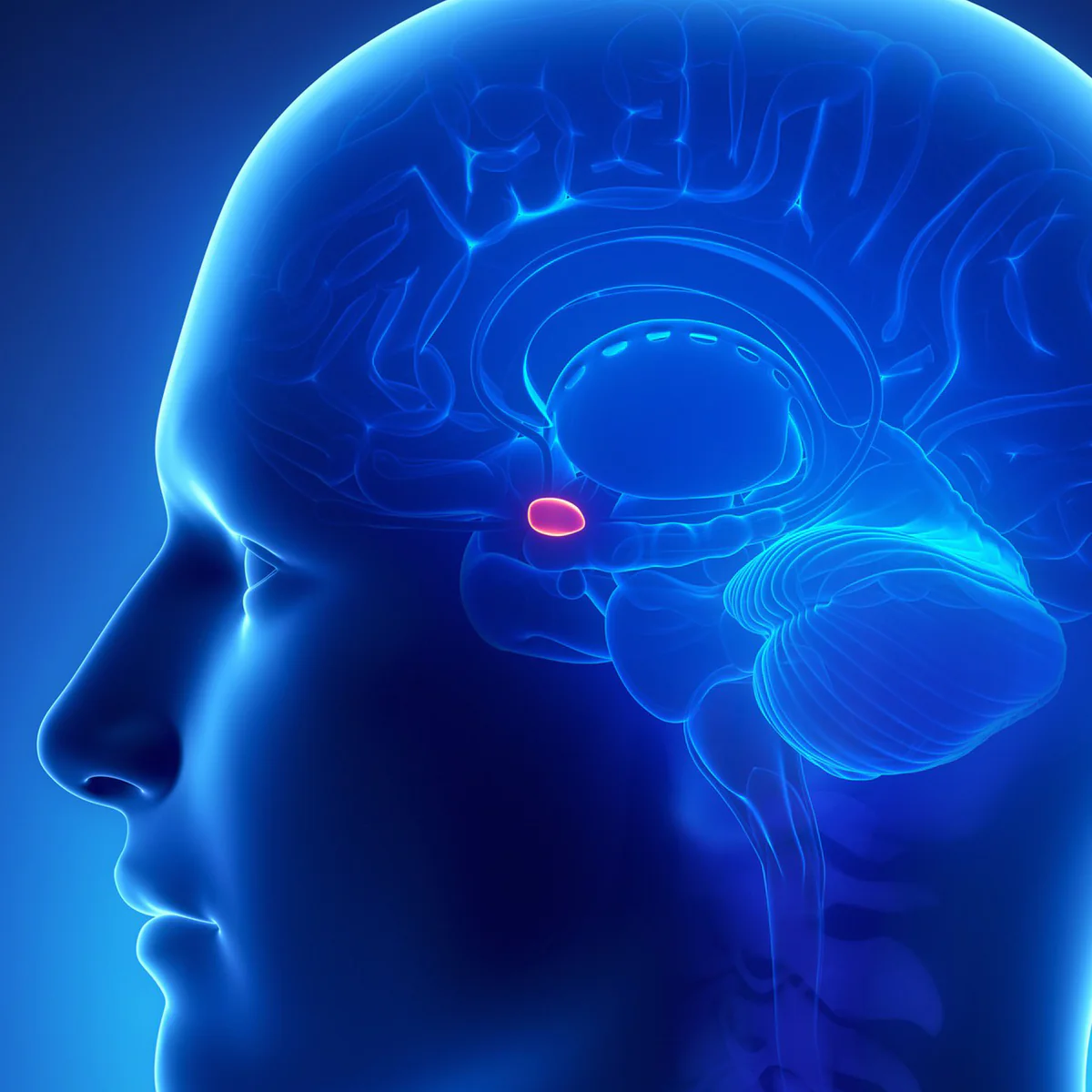
The Pineal Gland a Closer Look In 2023? The pineal gland is a small, pinecone-shaped endocrine gland located in the center of the brain. Despite its small size, this tiny gland holds great significance in various aspects of human health and spirituality.
What is the Pineal Gland?
The pineal gland, also known as the “third eye,” is a pea-sized gland situated deep within the brain. It plays a crucial role in the regulation of our body’s internal clock, influencing sleep patterns, hormone production, and other vital functions. Often referred to as the “seat of the soul,” the pineal gland has captured the curiosity and fascination of scientists, philosophers, and spiritual seekers throughout history.
The Anatomy of the Pineal Gland
Structure
The pineal gland is composed of pinealocytes, specialized cells that produce and secrete melatonin, a hormone responsible for regulating sleep-wake cycles. These pinealocytes are supported by glial cells, which provide structural support and nourishment.
Location
Situated in the deep midline of the brain, the pineal gland is nestled between the two hemispheres, just above the brainstem. Its location allows it to receive direct signals from the optic nerves, helping it to synchronize with the daily light-dark cycle.
The Function of the Pineal Gland

Production of Melatonin
One of the primary functions of the pineal gland is the production and secretion of melatonin. This hormone plays a crucial role in regulating our sleep patterns and circadian rhythms. Melatonin production is influenced by light exposure, with levels being higher during the dark hours, promoting sleepiness and relaxation.
Readj More: 10 Tips for Choosing the Right LED Projector In 2023
Regulation of Circadian Rhythms
By secreting melatonin, the pineal gland helps to regulate our body’s internal clock, known as the circadian rhythm. This internal clock governs various physiological processes, including sleep, hormone production, body temperature, and metabolism. Disruptions in the circadian rhythm can lead to sleep disorders and other health issues.
Influence on Sleep Patterns
The pineal gland’s role in melatonin production directly affects our sleep patterns. By releasing melatonin at night, the pineal gland signals to our body that it is time to rest and sleep. Adequate sleep is essential for overall well-being and plays a significant role in maintaining good physical and mental health.
The Role of the Pineal Gland in Spiritual and Philosophical Traditions

Historical Significance
The pineal gland has long held spiritual and philosophical significance across different cultures and traditions. Ancient civilizations believed that the pineal gland was the gateway to higher states of consciousness and spiritual realms. Renowned philosopher René Descartes even referred to the pineal gland as the “seat of the soul” in the 17th century.
The Third Eye Concept
The concept of the “third eye” associated with the pineal gland is prevalent in Eastern spiritual traditions. It is believed to represent an inner eye capable of perceiving beyond the physical world. Activating the third eye is said to enhance intuition, spiritual awareness, and the ability to access higher levels of consciousness.
The Pineal Gland and Its Connection to Health
Influence on Hormonal Balance
Beyond its role in sleep regulation, the pineal gland also plays a crucial part in maintaining hormonal balance in the body. Melatonin production by the pineal gland influences the secretion of other hormones, such as serotonin and dopamine, which impact mood, appetite, and sexual function.
Impact on Mood and Mental Health
Imbalances in melatonin production or dysfunction of the pineal gland have been linked to mood disorders, such as depression and seasonal affective disorder (SAD). Optimizing the health of the pineal gland and ensuring proper melatonin secretion can positively affect mental well-being.
The Pineal Gland and Aging
As we age, the pineal gland undergoes natural changes, which may affect its functions. Reduced melatonin production and calcification of the pineal gland have been associated with age-related conditions, including sleep disturbances and cognitive decline. However, further research is needed to fully understand the impact of aging on the pineal gland.
Advancements in Understanding the Pineal Gland
In recent years, research efforts have shed new light on the functions and mysteries of the pineal gland. Advanced imaging techniques and molecular studies have provided valuable insights into its structure, function, and potential therapeutic applications.
Emerging Medical Applications
Scientists and medical professionals are exploring the potential medical applications of the pineal gland. Studies are being conducted to investigate its role in certain neurological disorders, mental health conditions, and even its potential in regulating the body’s biological clock.
Maintaining a Healthy Pineal Gland
Lifestyle Factors
Several lifestyle factors can support the health and optimal functioning of the pineal gland. Regular exposure to natural light during the day, engaging in regular physical exercise, managing stress levels, and maintaining a balanced sleep routine are all beneficial for the pineal gland’s well-being.
Dietary Considerations
Certain foods and supplements have been associated with supporting pineal gland health. Antioxidant-rich foods, such as berries and dark leafy greens, along with omega-3 fatty acids found in fish and flaxseeds, are believed to have positive effects on the pineal gland. Additionally, avoiding processed foods and reducing sugar intake can contribute to overall glandular health.
Reducing Exposure to Toxins
Toxins in our environment can potentially affect the pineal gland and its functions. Minimizing exposure to harmful substances, such as heavy metals, pesticides, and synthetic chemicals found in certain household products, can help maintain the pineal gland’s health and integrity.
Debunking Common Myths about the Pineal Gland
Fluoride and Calcification
There is a common myth that fluoride from water and dental products can lead to calcification of the pineal gland, impairing its function. However, current scientific evidence does not support this claim. Fluoride levels in drinking water and dental products are safe and do not pose a significant risk to the pineal gland.
Decalcifying the Pineal Gland
Various online sources suggest methods for decalcifying the pineal gland, claiming it can enhance spiritual experiences and overall well-being. However, there is limited scientific evidence supporting the effectiveness of these methods. It is important to approach such claims with caution and consult reliable healthcare professionals for personalized advice.
Conclusion
The pineal gland, often associated with mysticism and spirituality, plays a vital role in regulating our sleep-wake cycles and maintaining overall health. While its exact functions and significance continue to be explored, it is clear that the pineal gland holds immense potential in understanding human biology and unlocking new avenues in healthcare and well-being.
Get Access Now: https://bit.ly/J_Umma
FAQs
Q: Can the pineal gland be activated?
A: While there is no scientific evidence to support the idea of “activating” the pineal gland, certain practices such as meditation, mindfulness, and a healthy lifestyle can support its optimal functioning.
Q: How can I improve the health of my pineal gland?
A: Maintaining a balanced sleep routine, getting regular exposure to natural light, managing stress, and adopting a healthy diet are key factors in supporting the health of the pineal gland.
Q: Is the pineal gland the seat of the soul?
A: The idea of the pineal gland being the “seat of the soul” is a philosophical concept and not supported by scientific evidence. The pineal gland has important physiological functions but its connection to the soul is subjective.
Q: Does the pineal gland play a role in intuition?
A: While the pineal gland has been associated with spiritual experiences, there is limited scientific evidence to directly link it to intuition. Intuition is a complex cognitive process that involves various brain regions.
Q: Can the pineal gland affect our spiritual experiences?
A: The pineal gland’s role in spiritual experiences is still not fully understood. While it has historical and cultural significance in spiritual traditions, the precise relationship between the pineal gland and spirituality remains a topic of exploration and debate.











